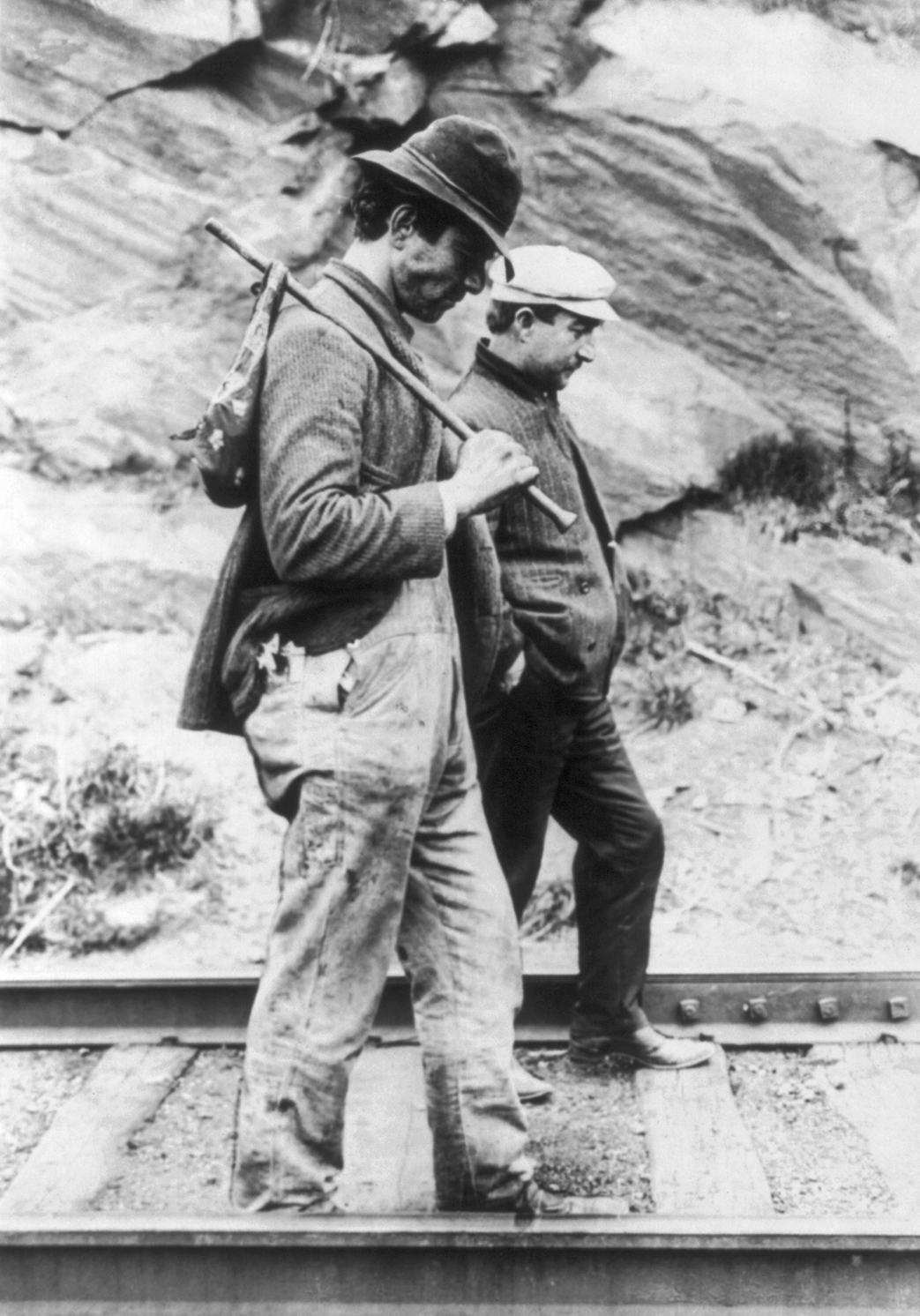|
Dromomania
Dromomania was a historical psychiatric diagnosis whose primary symptom was uncontrollable urge to walk or wander. Dromomania has also been referred to as traveling fugue. Non-clinically, the term has come to be used to describe a desire for frequent traveling or wanderlust. Etymology The term ''dromomania'' is derived from combining the Greek language, Greek , meaning "running" with the root ''mania''. The term has sometimes been clinical and Medicalization, pathologizing, and other times been descriptive of unusual enthusiasm without negative or medicalizing connotations, reflecting the diverse uses of the term mania itself. In the 17th century, the term ''mania'' came to be used to describe any show of great enthusiasm for a specific activity or object. Later, it came to be used as a suffix for Greek words to refer to an irrational obsession, such as in the words ''hippomania'', and ''nymphomania''. At the same time emerged the French , such as in , which was borrowed into Eng ... [...More Info...] [...Related Items...] OR: [Wikipedia] [Google] [Baidu] |
Jean-Albert Dadas
Jean-Albert Dadas (10 May 1860 – 28 November 1907), also known as the "Running Man" and "The First Fuguer", was a France, French :Gasfitters, gas fitter renowned for being one of the most notable cases of dromomania, a psychological condition characterized by an irresistible urge to wander with no discernible reason or recollection. Dadas, the presumed Patient Zero of the compelling wandering epidemic that swept through Europe, is a perplexing figure at the cusp of the nineteenth and twentieth centuries. Dadas gained prominence as the first documented case of "pathological tourism". His life was marked by an irresistible compulsion to wander and travel, embarking on extensive and often perilous journeys which captivated the public's attention. His condition is remarked and documented through the case study and treatment performed by the learned medical student, Philippe Tissié (1852–1935). Biography Dadas was born on 10 May 1860 in Bordeaux, France to a family of gas workers. ... [...More Info...] [...Related Items...] OR: [Wikipedia] [Google] [Baidu] |
Wanderlust
Wanderlust is a strong desire to wander or travel and explore the world. The term has its roots in German Romanticism. Etymology The first documented use of the term in English occurred in 1902 as a reflection of what was then seen as a characteristically German predilection for wandering that may be traced back to German Romanticism and the German system of apprenticeship (the journeyman), as well as the custom of adolescent wanderings in search of unity with nature. The term originates from the German words ('to hike') and ('desire'), literally translated as 'enjoyment of hiking', although it is commonly described as 'enjoyment of strolling, roaming about, or wandering'. In recent years, the word is less commonly used in German, having been largely supplanted in the sense of 'desire to travel' by ('a longing for far-away places'), coined as an antonym to , 'homesickness', or 'travel fever' (). Sociology Robert E. Park in the early twentieth century saw wanderlust as ... [...More Info...] [...Related Items...] OR: [Wikipedia] [Google] [Baidu] |
Drapetomania
Drapetomania was a proposed mental illness that, in 1851, American physician Samuel A. Cartwright hypothesized as the cause of enslaved Africans fleeing captivity. This hypothesis was based on the belief that slavery was such an improvement upon the lives of slaves that only those suffering from some form of mental illness would wish to escape. Cartwright specifically cited the tendency of slaves to flee the plantations that held them. Since slaves happy with their condition would not want to leave, he inferred that such people had to be sick, impervious to the natural order of things. He published an article about black slaves' illnesses and idiosyncrasies in '' De Bow's Review''. Contemporarily reprinted in the South, Cartwright's article was widely mocked and satirized in the northern United States. The concept has since been debunked as pseudoscience and shown to be part of the edifice of scientific racism. The term derives from the Greek (, 'a runaway lave) and (, 'ma ... [...More Info...] [...Related Items...] OR: [Wikipedia] [Google] [Baidu] |
Philippe Tissié
Philippe Auguste Tissié (1852–1935) was one of the first neuropsychiatrists in France. Together with Pierre de Coubertin and Paschal Grousset, he was the founder of French physical education, developing the schooling system to include sports and games. He was awarded the Legion of Honor in 1932. Early life and medicine Philippe Auguste Tissié was born to a Protestant family in La Bastide-sur-l'Hers in the Ariège department in southwestern France. Orphaned, he had to work from an early age. After several menial jobs, he became deputy librarian at a faculty of medicine. As a late student of medicine, he presented his thesis called ''Les aliénés voyageurs : essai médico-psychologique'' (Traveling Madmen: A Medico-Psychological Paper) on 16 February 1887, examining the case of Jean-Albert Dadas and popularizing dromomania. The thesis was made under the mentorship of Albert Pitres, himself a disciple of Jean-Martin Charcot. His experience from the medicinal association ... [...More Info...] [...Related Items...] OR: [Wikipedia] [Google] [Baidu] |
Dissociative Fugue
Dissociative fugue ( ), previously referred to as a fugue state or psychogenic fugue,Dissociative Fugue (formerly Psychogenic Fugue) 'DSM-IV 300.13, Diagnostic and Statistical Manual of Mental Disorders, Fourth Edition'' is a rare psychiatric condition characterized by reversible amnesia regarding one’s identity, often accompanied by unexpected travel or wandering. In some cases, individuals may assume a new identity and be unable to recall personal information from before the onset of symptoms. It is classified as a mental and behavioral disorderDrs; and is variously categorized as a dissociative disorder, a conversion disorder, or a somatic symptom disorder. According to the ''Diagnostic and Statistical Manual of Mental Disorders'' (DSM-5), dissociative fugue is a subset of dissociative amnesia. Recovery from a fugue state typically results in the restoration of prior memories, and additional treatment is generally unnecessary. Episodes are not considered dissociative fugu ... [...More Info...] [...Related Items...] OR: [Wikipedia] [Google] [Baidu] |
Nymphomania
Hypersexuality is a proposed medical condition said to cause unwanted or excessive sexual arousal, causing people to engage in or think about sexual activity to a point of distress or impairment., according to the website of '' Psychology Today'', 2021. It is controversial whether it should be included as a clinical diagnosis used by mental healthcare professionals. Nymphomaniac and satyriasis were terms previously used for the condition in women and men, respectively. Hypersexuality may be a primary condition, or the symptom of other medical conditions or disorders such as Klüver–Bucy syndrome, bipolar disorder, brain injury, and dementia. Hypersexuality may also present as a side effect of medication, such as dopaminergic drugs used to treat Parkinson's disease. Frontal lesions caused by brain injury, strokes, and frontal lobotomy are thought to cause hypersexuality in individuals who have had these conditions. Clinicians have yet to reach a consensus over how be ... [...More Info...] [...Related Items...] OR: [Wikipedia] [Google] [Baidu] |
Prague
Prague ( ; ) is the capital and List of cities and towns in the Czech Republic, largest city of the Czech Republic and the historical capital of Bohemia. Prague, located on the Vltava River, has a population of about 1.4 million, while its Prague metropolitan area, metropolitan area is home to approximately 2.3 million people. Prague is a historical city with Romanesque architecture, Romanesque, Czech Gothic architecture, Gothic, Czech Renaissance architecture, Renaissance and Czech Baroque architecture, Baroque architecture. It was the capital of the Kingdom of Bohemia and residence of several Holy Roman Emperors, most notably Charles IV, Holy Roman Emperor, Charles IV (r. 1346–1378) and Rudolf II, Holy Roman Emperor, Rudolf II (r. 1575–1611). It was an important city to the Habsburg monarchy and Austria-Hungary. The city played major roles in the Bohemian Reformation, Bohemian and the Protestant Reformations, the Thirty Years' War and in 20th-century history a ... [...More Info...] [...Related Items...] OR: [Wikipedia] [Google] [Baidu] |
Vagrant
Vagrancy is the condition of wandering homelessness without regular employment or income. Vagrants usually live in poverty and support themselves by travelling while engaging in begging, scavenging, or petty theft. In Western countries, vagrancy was historically a crime punishable with forced labor, military service, imprisonment, or confinement to dedicated labor houses. Both ''vagrant'' and ''vagabond'' ultimately derive from the Latin word ''vagari'', meaning "to wander". The term ''vagabond'' and its archaic equivalent ' come from Latin ''vagabundus'' ("strolling about"). In Middle English, ''vagabond'' originally denoted a person without a home or employment. Historical views Vagrants have been historically characterised as outsiders in settled, ordered communities: embodiments of otherness, objects of scorn or mistrust, or worthy recipients of help and charity. Some ancient sources show vagrants as passive objects of pity, who deserve generosity and the gift o ... [...More Info...] [...Related Items...] OR: [Wikipedia] [Google] [Baidu] |
Hobo
A hobo is a migrant worker in the United States. Hoboes, tramps, and bums are generally regarded as related, but distinct: a hobo travels and is willing to work; a tramp travels, but avoids work if possible; a bum neither travels nor works. Etymology The origin of the term is unknown. According to etymologist Anatoly Liberman, the only certain detail about its origin is the word was first noticed in American English circa 1890. The term has also been dated to 1889 in the Western—probably Northwestern—United States, and to 1888. Liberman points out that many folk etymologies fail to answer the question: "Why did the word become widely known in California (just there) by the early Nineties (just then)?" Author Todd DePastino mentions possible derivations from " hoe-boy", meaning "farmhand", or a greeting "Ho, boy", but that he does not find these convincing. Bill Bryson suggests in '' Made in America'' (1998) that it might come from the railroad greeting, "Ho, beau!" or ... [...More Info...] [...Related Items...] OR: [Wikipedia] [Google] [Baidu] |
Brodyaga
"Po dikim stepyam Zabaikalya" () is a Russian folk song, also known as "Brodyaga" (). It was published and recorded at the beginning of the 20th century and has since become part of the repertoire of various Russian and foreign artists. History According to popular belief, the song was composed by convicts in Siberia towards the end of the 19th century. The revolutionary Ivan Belokonsky insisted, though, that it was known in Siberia in the 1880s, but there was no indication of the author of the lyrics. According to Ivan Nazarov (and Alexander Smolik), Ivan Kondratyev was the author of the lyrics, although the poem is not included in the latter's last published volume of poems, ''Under the noise of the Oak Groves''. In 1906, Swedish composer Wilhelm Harteveld also collected the song during his trip to Siberia and published it in 1908. In the early 20th century, several recordings of the song were made in Russia: * Brodyaga (From the songs of convicts) performed by Nadez ... [...More Info...] [...Related Items...] OR: [Wikipedia] [Google] [Baidu] |
Nomad
Nomads are communities without fixed habitation who regularly move to and from areas. Such groups include hunter-gatherers, pastoral nomads (owning livestock), tinkers and trader nomads. In the twentieth century, the population of nomadic pastoral tribes slowly decreased, reaching an estimated 30–40 million nomads in the world . Nomadic hunting and gathering—following seasonally available wild plants and game—is by far the oldest human subsistence method known. Pastoralists raise herds of domesticated livestock, driving or accompanying them in patterns that normally avoid depleting pastures beyond their ability to recover. Nomadism is also a lifestyle adapted to infertile regions such as steppe, tundra, or ice and sand, where mobility is the most efficient strategy for exploiting scarce resources. For example, many groups living in the tundra are reindeer herders and are semi-nomadic, following forage for their animals. Sometimes also described as "nomadic" are vari ... [...More Info...] [...Related Items...] OR: [Wikipedia] [Google] [Baidu] |





